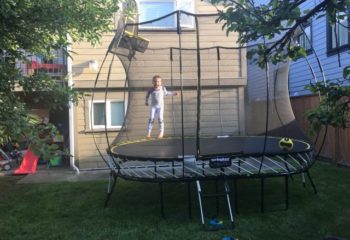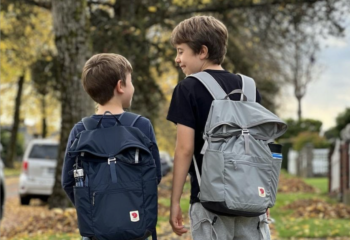
By Allison Tai
I was born (and survived my first few years) in a small town in Northern Alberta before making a move to the big smoke in the second grade. Well, not really. We moved to the very edge of town. On one side of our house, it was miles of other houses, people, cars. On the other, it was miles of trees, birds, grass. In a very literal sense I was never really a country kid but I never really adapted to city life. I would spend my days building dodgy tree forts and my evenings perusing the dollar movie line up at the mall. I’d spend Saturdays riding a little gray pony down dusty roads with no saddle or sense of fear. I would spend Sundays at the playground eating penny candy from Macs.
Later in life, I got more into horses… and for a time actually lived in a barn. But a few life decisions later I found myself living in one of the largest cities in this country.
Thus, when the choice to move to the country to raise our kids came up, there was no clear choice.
City Life
There are a multitude of reasons to raise a child amidst the backdrop of an eclectic and lively city. Even at two-years-old my daughter has ordered off a menu at a Japanese restaurant and danced at a Diwali festival, all in the same day. She can take hip-hop dance and or do Tai Chi… at the same community center. And we can walk to all of these activities from our house (and hit the grocery store on the way home). This probably contributes to the fact that urban kids have lower rates of obesity than city kids. That and lower incomes and a less educated population likely lead to poorer nutrition and activity decisions.
The city is full of seemingly endless choices. I can pick her school based on it’s academic performance, educational philosophy or extra-curricular activities. Montessori, French Immersion or Fine Arts? And she’s only in kindergarten. This array of choice becomes increasingly alluring as kids enter adolescence and want to explore things outside of the interests of their parents. In today’s multicultural world, they literally have the world at their feet.

Country Life
Life in the country tends to be slower. There are certainly more chores to do… but less stuff to distract you from them. Most of the tasks we do in the city have been replaced by robots. That makes me sound crazy. But really, who rang in your groceries at the market last? What did the teller where you last made a banking transaction look like? We’ve automated most of the mundane tasks and jobs out of our lives. But that only leaves a whole of a lot of space to do as much complicated work as possible with the rest of our time. And very little down time to say, water a tree. And it takes it’s toll on a person… especially our little people.
Country living is also generally more affordable, which means less strain financially. Studies time and time again show this to be a dominating stressor in the majority of relationships. It’s not like it’s free living outside the city limits, but land and taxes do tend to be substantially lower which might lessen the strain enough to make a difference.
Farm kids tend to spend more time outside, amongst fresh air, dirt, and greenery. And kids with higher exposure to nature tend to have lower levels of ADHD, aggression, and anger. What’s more, kids that live near trees and green spaces tend to have better coping mechanisms to deal with stress. They tend to be more coordinated at young ages. And kids that grew up close to nature that move to the city later on even show higher IQs and more creativity in some studies.
Even though farm kids are generally less physically healthy as their city counterparts, there is the “farm effect” to validate what I have always known to be true: real dirt is good for you. It appears to be a protective force in asthma and allergies.
There is no Better
As with any big decision I have ever made in my life, there is no better: just weighing the pros and cons and deciding what’s best for my family. Interestingly, across the studies, people take their healthy habits with them. Active families that eat well continue to do so in the country – and may well flourish with the added mental health benefits of living in green spaces. City dwelling families that have an appreciation for nature will likely make a concerted effort to soak up the benefits by visiting parks and hiking on weekends. I think if anything, I’ve learned that the most important thing is that it’s how you spend your time and the attitude you do it with that means the most.









10 Comments on “Country Life vs City Life”
We live the city life and prefer it that way! We moved to a small town an hour away thinking it was what we wanted for our future family and a good place to raise a family, which it is but wasn’t for us. after a few months we found ourselves missing all the amenities of living in the city. so after two years we moved back. But i do like it for when our family likes to have some family time away
We love to live in the city but we also go on lots on hikes and take breaks to go to the country. The best of both worlds!
I had both growing up because my parents were divorced, mom was in the city and dad in the country. I loved being in both worlds but now I live in the country and I’ll never go back to the city. There’s no traffic sounds, no neighbors cutting the lawn early or noisy at night. We have a huge 3 acre yard and we’re outside as much as possible. The country life is for me!
I have lived both lives and believe there are pros and cons with both. I myself prefer the country but I can see the advantages of city life. We don’t actually live in the country here but there’s no bus line so if you don’t have a car it’s a real pain to get anywhere. Whilst I do have a car now, if I look ahead another 10 yrs I probably won’t have one and what then? I’ll be stranded, not a nice thought at all.
We always love living in the city, but love the country life and spend lots of time outdoor exploring the country. For us it’s always been about convenience.
I have been raised all over the world; in cities and within the countryside. I have been blessed to experience both. In Canada, I have always lived in Calgary, so I have had the best of both. I spent much of my childhood outdoors in the mountains and foothills, hiking, snowboarding, camping, playing. But also accessed, arts, culture, and so much more in the city. My boys are being raised the same way… with a lot of international exposure to prepare them for the real world.
Definitely a hard decision. I would love somewhere in the middle.
We lived in a big city for over 30 years but moved to the suburbs in a new province just 2 years ago. We’re still connected to a large city and not that far away from the city, but we’re enjoying living in a much quieter neighbourhood.
I have lived the big city life, but I prefer the small city life. A place where there is still amenities but you don’t worry about your children riding there bike around the block.
I have lived in both the country and the city and while I really have no desire to move back to the country I do really feel the crunch financially here in Victoria like I never have before. If it wasn’t for the fact that my daughter would be devastated to leave here we would move, but after going to school with some of these kids since daycare, it is a big thing. For her, she’d rather stay in a small 2 bedroom condo than move to MB where we could have a place more than twice the size with much more spending money. It’s actually something to appreciate – if only she’d remember that when she’s being a typical teenager and wanting ‘more’. LOL